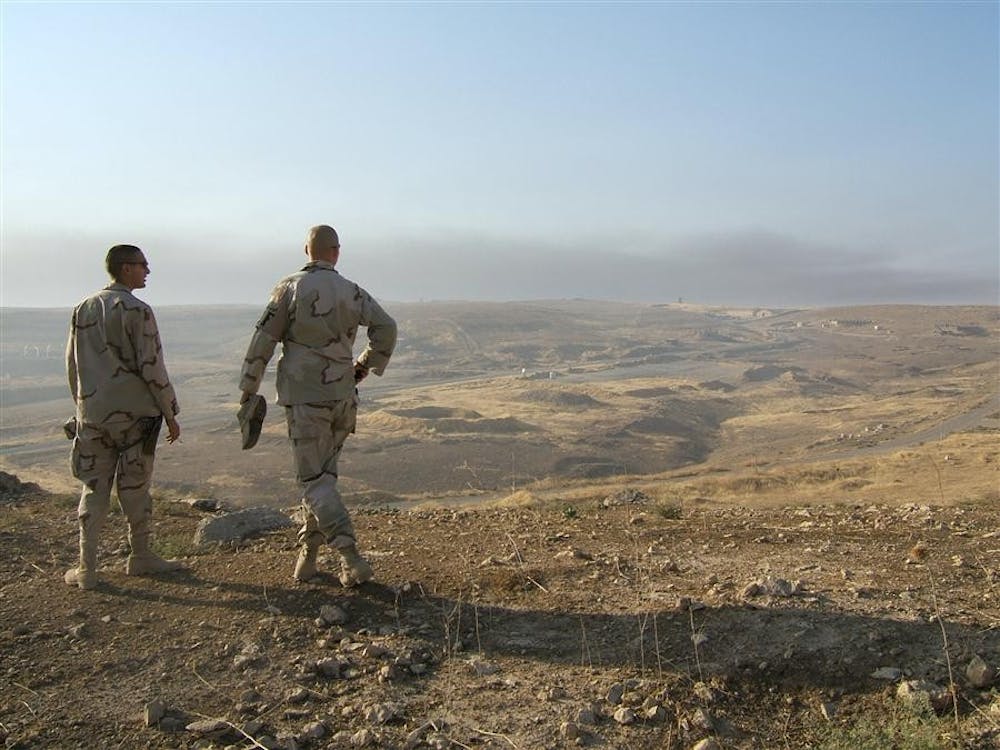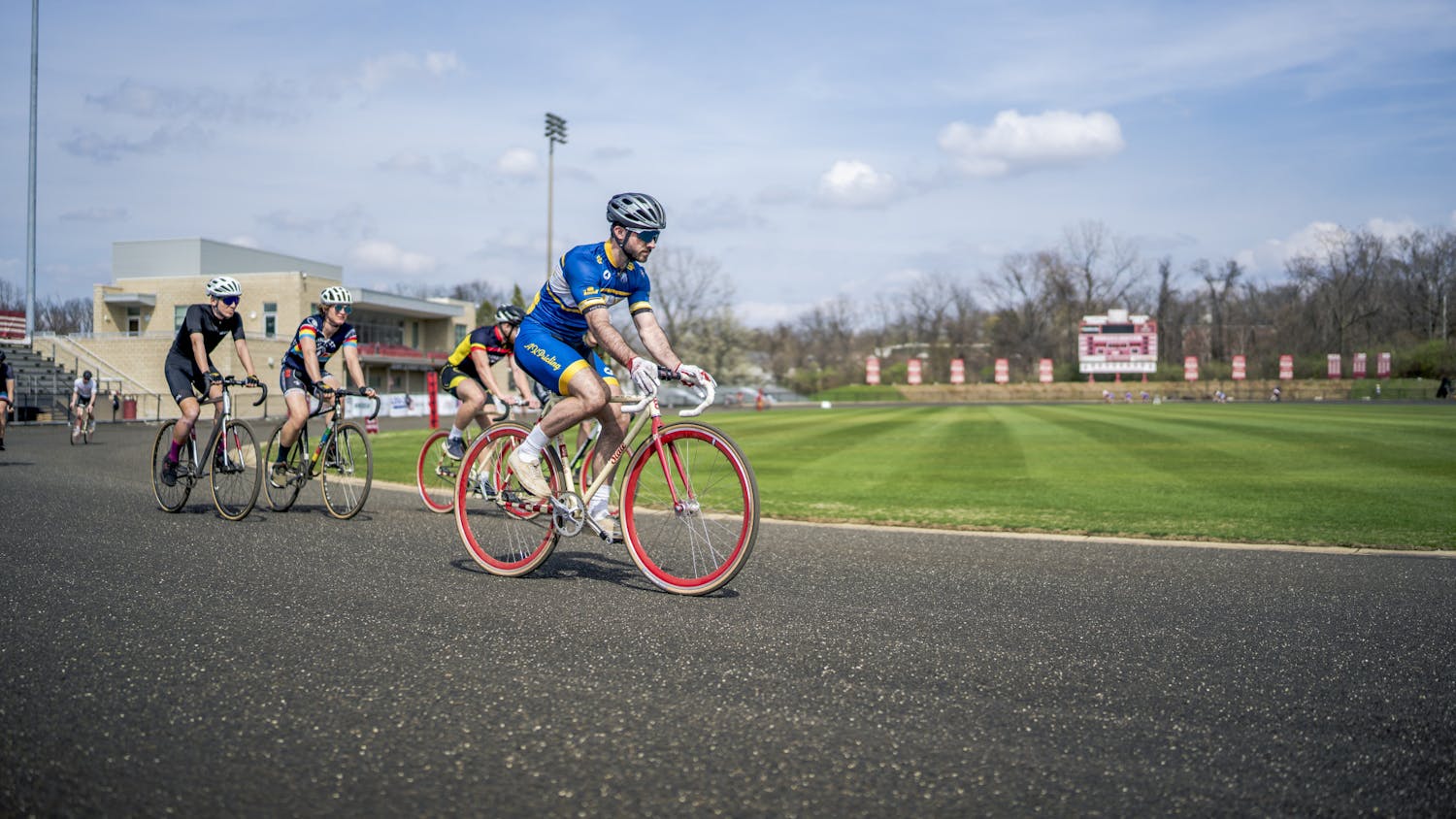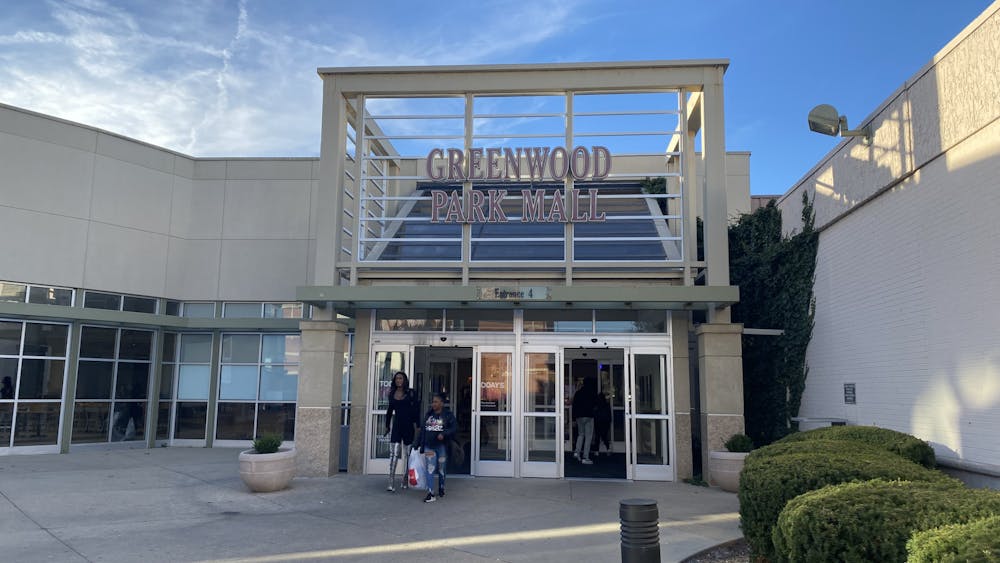The finger that flips through the textbook used to rest on a trigger. The hand that rises in class to ask a question once saluted an officer. The feet that walk through Dunn Meadow used to patrol door to door in Iraq.
Hundreds of student veterans walk among us on this campus. They sit next to you in Spanish, behind you in W131 or in front of you in finite.
We remember the troops. We remember the war. But we’ve forgotten the soldier.
The nation never welcomed these men and women home. There isn’t a victory to celebrate. There still isn’t an end in sight.
These soldiers come and go through the classrooms in Bloomington, just small drops in the ocean of students.
You wouldn’t look twice if you passed one on the street. You probably already have.
These are 21st Century Soldiers.
***
Kayla Nier, 24
Specialist, Indiana Army National Guard
Senior, Human Biology major
Meeting Toby Keith, Jessica Simpson, Carlos Mencia and Gen. David Petraeus would have been a highlight for many of the soldiers serving in Iraq. But for Kayla Nier, it was trying to win the hearts and minds of Iraqi children.
As she distributed backpacks of supplies to kids at school, one boy told her that “Americans aren’t bad.” She realized then that the adults are set in their ways, but the kids can change.
“Here’s this kid, probably about 10 years old, thinking that everything he has been taught to believe and sees that these troops that are walking around with these big guns and stuff, they must be bad people. And as I handed him this backpack: ‘You aren’t bad; you guys aren’t bad.’ And this is exactly what it’s for: that one kid. If no one else changed, then it was worth it for that one kid.”
Nier started a nonprofit called Winning Hearts and Minds to help collect supplies for the children in Iraq and then helped distribute them during her deployment. Last year, the nonprofit sent more than 500 boxes to a school, and each child received a backpack full of supplies for their families.
“I knew when I came home that I would have to go back to my normal life that I did before I was deployed. But it was different this time because now. I had seen what most people never see, and it was like a new beginning. I came home, and it was like a brand new life now because I was looking at everything in a different way.”
When Nier deployed, her vision of Iraq was long, flat land and dust and sand. But when she got there, she saw what she considers to be progress in the war.
“It’s also a win for Iraq. They have electricity there. They have jobs. We built water towers, schools, hospitals, houses. They didn’t have that before, and they have it all now. They have all this there, and that’s because of the military.”
Nier said even though there are humanitarian benefits for the people, she still considers Iraq to be a lose-lose situation.
“You pull out now and everything that we’ve done in the last nine years is going to crumble and be forgotten about. But you leave us in there for the next 20 years and soldiers are still going to be shot. ... and you pull them out in 20 years and people are still going to go back to their old ways.”
She said she thinks it will be up to the Iraqi children to decide the fate of their country — it’s the only way to win the war.
“We just do our job. I wouldn’t call us heroes, and I wouldn’t say that we’re not heroes. Just that we did our mission, and we do what we were supposed to do — we came back.”
***
Krista Dora, 24
Specialist, Army
Junior, General Studies
Even though women are banned from combat positions, Krista Dora often found herself in the middle of the war from her perch on tower guard.
“There are no front lines in Iraq. You’re there.”
Dora spent eight hour shifts in the open tower under frequent fire as she watched a notoriously dangerous road, MSR Tampa.
“In the Army, we call it IED alley. It’s where all the IEDs and the bombs and explosions go off. You’re watching all the convoys going by and making sure they’re not being blown up. You’re also in charge of watching a huge Iraqi village where there are a lot of people walking around with AK-47s and bombs.”
Dora said she expected the war to be what she saw in the news and movies or heard about from other veterans, but as she stood in the guard post she realized it was
quite different.
“There’s definitely no comparison as far as seeing it and being there 24/7 for X amount of time compared to a video game or a movie,” she said. “I did the
real thing.”
Dora had dreamed of being a soldier since she was a kid.
“I wanted to go because I love our country, and I love the freedoms that we have and I believe in fighting for them.”
Now she motions to her black T-shirt that says, “Iraq Veterans Against the War.” After experiencing life as a soldier, she is no longer disillusioned by her childhood dreams.
“I support our troops, but I’m against the war.”
***
Michael Mojonnier, 25
Senior Airman, U.S. Air Force
Sophomore, Anthropology major
Michael Mojonnier’s job didn’t change when he got to Iraq. He worked as a military policeman issuing citations for driving under the influence and trying to curb the high levels of physical and sexual assaults.
“I personally felt kind of like a rat. These guys are supposed to be on the same team, and I was out looking for them to get them in trouble. But our mission was to provide them with a safe environment.”
The only difference with that mission in Iraq versus stateside was dealing with the world outside of the walls.
“When you go home at the end of the day stateside for a job, you can relax, do whatever. In Iraq, it was like, ‘Oh man, is there going to be a mortar hitting my trailer tonight? Is there going to be rocket attack that I’m going to have to go to? Is a stray bullet going to hit me when I’m sleeping?’ You got those little things in the back of your mind that you’re dealing with.”
For the soldiers Mojonnier was policing, it was the build up of stress that led them to take it out on each other. Mojonnier said just knowing that the mission was dangerous and that the people outside the walls wanted to kill you was too much for many of them.
“If you keep sending people to fight and kill people and blow things up and that’s their job, it’s going to mess them up in the head. Humans have an aversion to squaring off one-on-one and killing each other. It’s just the nature of war. It’s what happens. People get messed up from it. Some more than others. Some don’t get messed up at all.”
***
Eric East, 35
Lance Corporal, Marine Corps
Sophomore, Telecommunications major
Eric East was at a bar in Australia on Sept. 11, 2001. He knew then he was going to war. His unit deployed immediately to Afghanistan because they were
the closest.
“When I was overseas when Sept. 11 happened, it very much seemed like a very important, very necessary war. But then after I got out I started looking into it a lot more in depth because I wanted to know why we’re fighting over there and why my buddies lost limbs and everything. And after what I found I have to say that both are completely unnecessary wars.”
East said he began questioning the war in Afghanistan soon after he got there. In one incident, the officers gave the pilot orders to shoot an unknown vehicle. The intelligence officers tried to argue against it because it could have been the allies from the Northern Alliance who had white crosses marked on the top of their convoys and requested that the pilot get a closer look, East said.
“The officers in charge said, ‘No, we don’t want to take the risk of putting this pilot in danger’ and wiped out the entire convoy. I still don’t know to this day if they were Taliban or Northern Alliance.”
At the time, East was shut off from outside information, including Internet access. He started investigating the incident and the war as soon as he got out of the military.
“The entire time between getting out of the military and going here to IU, I spent like seven years just devouring all this information on the Internet. I’ve come to the conclusion that the War on Terror is little more than the holy crusades just in disguise.”
***
Frank Linville, 27
Staff Sergeant, Army
Sophomore, Linguistics major
Frank Linville met his wife in Ramadi, Iraq, during his first deployment. She is a
soldier, too.
They dated long-distance before getting married after his second deployment.
By his third deployment, Linville was kissing his six-month-old daughter good-bye.
“It was crazy. I’m glad she was as young as she was though when I left, because it was very easy for her to adjust to my coming back.”
Linville had heard horror stories about readjusting to family life when returning from Iraq.
“When I came back from the airport and we finally met, I think for 20 minutes she was pretty shy. She knew who I was, but was kind of nervous. After that she was friendly, laughing, playing, and within a couple weeks, she was treating me like I had never left.”
Now, he is a sophomore at IU with life and love experiences that are very different from his 19-year-old classmates.
“I believe I am a much better individual on the whole after coming out of it. The opportunities I had to help others, to guide other soldiers particularly as a sergeant, as a leader, was really rewarding, and I really enjoyed it. It’s probably one of the biggest things I’m going to miss in the long run.”
After three deployments, Linville has returned to Bloomington as a veteran, a father, a husband and a student.
***
Tim Whitson, 23
Specialist, Army
Sophomore, Informatics major
When Tim Whitson heard the rounds getting closer and saw the metal shrapnel flying into his guard post, he ducked behind a sand bag.
“When they walk them in, they walk them closer and closer until they finally hit you.”
The next rocket-propelled grenade landed just outside of his guard post. The bag of sand wouldn’t have helped.
“It exploded, and I blew my ear drums immediately. You see stars, and you can’t breathe really well because of that gunpowder smell, like fireworks, getting in your nose and your mouth. You can’t see because there’s so much smoke and dust.”
Whitson was lucky at that moment — he didn’t die and wasn’t visibly wounded. His brain injury and post traumatic stress disorder wouldn’t show up until later.
“I would have panic attacks, and I wouldn’t really know what it was at first. Your mind goes crazy, and you feel like you’re losing control of yourself.”
The change in lifestyle from the military to college exacerbated his PTSD.
“The unit that I was in would just keep you on edge all of the time. Jumping out of airplanes is terrifying, jumping out in combat gear really low to the ground. Being combat is terrifying. Being shot at, blown up, it just keeps you on edge. To go from that to a laid-back lifestyle is difficult.”
When Whitson enlisted, he said he thought he was doing the right thing. Now, he would never do it again.
“What did we really accomplish? I don’t see that the ends justify the means.”
***
Stephanie Tremblay, 23
Specialist, Army
Sophomore, Psychology major
Stephanie Tremblay talks excitedly about the 2009 Super Bowl: the Arizona Cardinals versus the Pittsburgh Steelers. She wore her No. 7 jersey and stayed up late, eating pizza and watching her team win with friends.
The post office where she worked had a bet going: If the Steelers won, they didn’t have to come in until 10 a.m. If they lost, they had to report at 7 a.m.
When the Super Bowl finally ended at 4 a.m. in Kuwait, she was thankful — the Steelers had won so they got to sleep in.
What seem to be normal holiday traditions are hard for 21st century soldiers deployed overseas.
“Thanksgiving sucked. I’m not going to lie. They actually had a whole turkey, and I was impressed by that. Everything else was kind of bland. Christmas was just as hard.”
To help, Tremblay’s mom sent her a 5-foot Christmas tree and decorations, which she put up in the post office in Kuwait.
It wasn’t a typical Christmas for a college student.
“In my sociology class, we’re trying to relate things to everyday experiences, and for the last five years I haven’t had what people would consider a normal experience. I’ve been deployed.”
She added that going back to college has been a learning experience.
“It’s a little weird for people when they find out I’m 23, and I’m only a sophomore in college. I wanted to go back to school and, guess what, I’m here. It’s fun.”
***
Chris Hughie, 22
Corporal, Marine Corps
Senior, Criminal Justice and East Asian Studiesmajor
Chris Hughie always has to smile in pictures, even during tours in Iraq and Afghanistan.
“I want my mom to always think I’m happy and having fun,” he said, pointing out a photo of him eating Fun Dip candy in a humvee.
“My parents wanted me to go to college. So I joined the reserves and started going to college, got deployed, and now I’m about to graduate. I’m still in the Marine Corps — I basically got to see the best of both worlds.”
Hughie now works on reconciling and striking a balance between his military life in Baghdad and his student life in Bloomington.
Hughie’s deployment to Iraq was “mellow” while Afghanistan was “miserable.”
“You’re over there and you’re stressed out all the time because you’re in a combat zone, you could die. ...Back home it’s like, oh I got bills to pay. I’ve got all this homework. I’ve got to worry about this or that. Over there, all I’m really worried about is dying and if I do, then alright.”
Instead, Hughie concentrated on his mission.
“You can’t think about that stuff in order to accomplish your mission properly. If you’re always worried about dying, then you’d be too afraid to do whatever it is you’ve got to do.”
***
Samuel Gras, 34
Captain, Army
Non-degree seeking student, foreign languages
Samuel Gras is back.
He started studying international security and history at IU in 1997, but joined the Army after seeing Sept. 11.
“I didn’t want to watch the war from my couch. I wanted to see it for myself and be a part of it.”
However, Gras needed to do more than just fight for freedom. He wanted to bring those experiences back to Bloomington.
“If you’re in a social science class and you’re trying to state your opinion, that’s great, but it’s still an opinion. So for someone that’s just read the book versus someone that’s actually done it, I thought that it would give me a little advantage.”
Now that he is back in class, Gras said he’s kind of surprised that most students don’t have more questions or aren’t more curious.
“It seems like they want out of sight, out of mind about it all, which is OK. It’s a long war. You can’t just think about it every day.”
***
Dacia Sachtjen, 21
Specialist, Indiana Army National Guard
Junior, Elementary education major
Dacia Sachtjen doesn’t know if she should register for spring classes. The National Guard told her to continue life as normal because sometimes things come up.
Sachtjen will be deployed to Iraq in March for a year-long tour working as a paralegal.
“My boyfriend at the time had just left 15 minutes before to go back to North Carolina, so I was already upset at that point, and then I find out I’m getting ready to get deployed, so that didn’t make me feel any better. So I called him and I said, ‘I have really bad news or good news, however you’re going to take it.’”
She said she still doesn’t know if this is good or bad news.
“I’m kind of both ways right now. I’m excited and nervous, and I think its going to be a good experience, but I’m very family and friend oriented, and I don’t want to leave my family or friends behind.”
She’ll miss Little 500. It will delay her graduation by one year. She’ll miss spring break and have to celebrate her 22nd birthday, on Sept. 11,
in Iraq.
“I’ll probably just not mention its my birthday and just let it blow over. Maybe say it was yesterday or the next day.”
Either way, she won’t be back in Bloomington to celebrate.
“My friends will be like ‘Oh, what are you doing this summer? We should go here and do this,’ and I’ll be like ‘I’ll be gone. I’ll be in Iraq.’”
***
Jeremy Degler, 26
Sergeant, Marine Corps
1st year graduate student, Environmental science - ecology/water resources major
Jeremy Degler was once a romantic about war.
He’d wanted to be a Marine since he was 8 or 9 years old and then sealed the deal watching Sept. 11 unfold on TV.
“Really I had no idea. I had this romanticized idea of going off to war. Nothing you can really expect is exactly how it turns out to be. It’s even stranger once you get over there. We train for all of this war fighting and actual blowing stuff up, but when you’re there, you don’t see who you’re fighting half the time because they’re hiding among civilians.”
Degler’s opinion about war and America started changing on the ride over to Iraq with the Navy.
As they stopped at different ports, Degler said he was saddened when he saw how people would look at him when they realized he was American.
“I was telling people I was in the Canadian Navy just so they would get me a drink. Stink eye is an understatement. Some people would just turn around and walk away.”
Despite the public’s negative perception of the war, Degler said he does believe there are positive changes coming to Iraq, and he said he’s proud of it.
“When I was over there, I saw a lot of good things we were doing, which most of the time didn’t come back to the media here — watching the news all you ever hear about are soldiers dying and roadside bombs. But I saw a lot of people building schools, going door to door helping families get what they needed to survive.”
***
Rudy Eckstein, 25
2nd class petty officer, Navy
Sophomore, Secondary Education - Chemistry major
Rudy Eckstein always dreamed of working on a submarine.
“Before I went in, I thought it was going to be like [the movie] ‘Hunt for the Red October.’ We were going to go out and find commies and shoot them down with torpedoes and shoot guns and kill people.”
Instead, Eckstein was in charge of monitoring the nuclear radiation on the submarine and making sure it stayed at the appropriate level.
“It’s extreme boredom most of the time, but then you get two or three days of absolute going crazy. And that’s normally because we’re all about to die.”
There were a couple times when the oxygen generator broke down or the submarine
sprung a leak and the ocean started seeping in, he said.
In the end, when he realized the dangers of his job, Rudy decided to leave.
Three of his close friends got cancer in their early twenties.
The Navy insisted that it wasn’t from the radiation that they and Eckstein were exposed to every day, but still paid for their medical bills during cancer treatment.
Two of the three died before reaching their 27th birthdays.
“Just watch your best friend die over the course of three years and you won’t want to do whatever it is. Even if it has nothing to do with it, if you think there could have been something you’ll just walk away. Now I’m going to go be a teacher, which is significantly less radiation, although I think a little scarier.”
Soldiers among us

Get stories like this in your inbox
Subscribe





